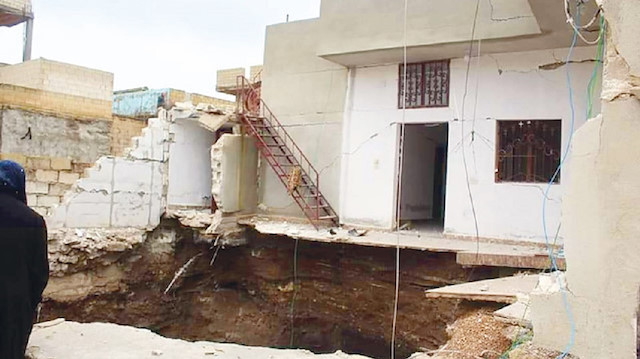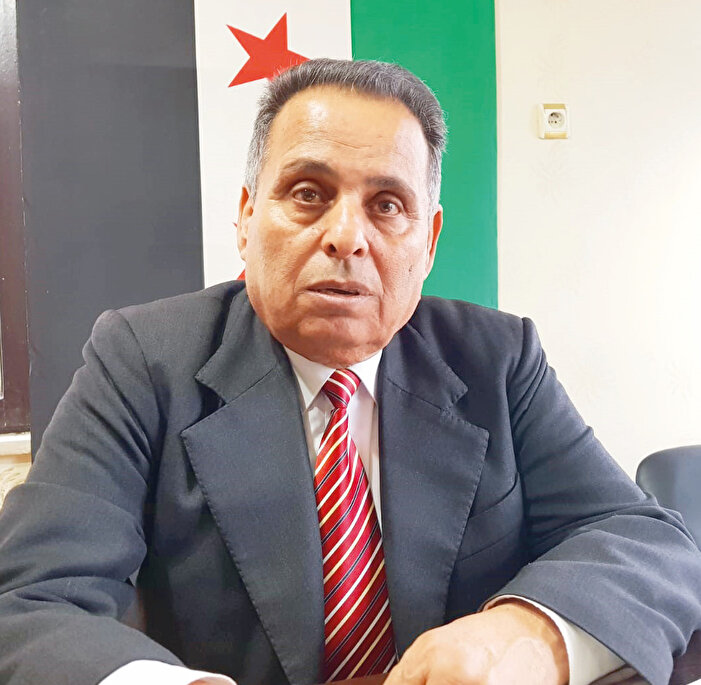
The PKK terror group is forcibly seizing fields and destroying houses in Syria, like the hostile occupation of Israel in Palestine
Policies of forced displacement and razing homes carried out by the U.S.-backed Kurdistan Workers’ Party (PKK) terror group in eastern Syria resembles those practiced by Israel in Palestine, according to a Syrian opposition official.
Raqqa’s former Deputy Governor Abdullatif al-Qashal spoke exclusively to Yeni Şafak daily about the recent developments near the border with Turkey.
Hundreds of tunnels were dug so close to the border in the towns and cities of Tal Abyad, Ras al-Ayn, Ayn al-Arab, Derbasiyeh and Malikiyyeh.
“Six houses that belonged to me and my relatives in the Tal Abyad town of Mounbatah were seized by PKK terrorists.”
“700 square kilometers were forcibly taken from us. Fields where we grew cotton and cereals are now being cultivated with drugs. Raqqa, Hasakah, Deir Ez-zor and Manbij are witnessing the bloodiest occupation and looting in history,” continued al Qashal.
Over 750,000 Palestinians were expelled from Palestine when West Jerusalem was occupied by Israel in the Arab-Israeli war of 1948. This is referred to as the Nakba, or catastrophe, when Israel was officially founded. Eastern Jerusalem was occupied by Israel in 1967, although this annexation has never been recognized internationally. A UN vote in December 2016 declared that Palestinian territories were under hostile occupation.

In addition to transporting weapons and munitions to the border, the U.S. has been moving large quantities of cement and iron.
Tons of iron and cement were transported by the U.S. to the border from Assad-controlled regions, Egypt and Iraq.
Despite the fact that most of eastern Syria is still in ruins, these resources are being spent on building a terror tunnel near the border.
The terror organization is trying to relocate most of its headquarters underground and establish a line of resistance due to the region being on level ground.
Work on building these tunnels started a year ago but only now began “in earnest.”
Over 70 houses were destroyed due to these tunnels, and many other residences along the 10- 15 kilometer border are at a risk of collapse.
The PKK continues with its policy of forced displacement as no homeowners whose houses were destroyed received any sort of payment.”
Thousands of homes across several towns and villages remain at risk due to the construction of the underground tunnels.
Israel has razed thousands of Palestinian homes, building Jewish settlements instead, in its attempt to drive Palestinians out.
Israel’s settlements have repeatedly been described as having “no legal validity, constituting a flagrant violation under international law and a major obstacle to the vision of two states living side-by-side in peace and security, within internationally recognized borders,” as stated by a UN Security Council Meeting in December 2016.
Syria faces a “disaster of massive proportions,” warned al-Qashal, calling on Turkey to intervene in the region.
“The honor of the region’s people is being tarnished by the terror group and its supporters. If Turkey’s intervention is delayed, the scope of the disaster will only grow. We’re looking forward to the day the region will be liberated with the help of it residents and the Turkish Army.”
A possible mission east of the Euphrates, which Turkey’s leadership has been suggesting for months, would follow two successful cross-border Turkish operations into Syria, Euphrates Shield and Olive Branch, both meant to eradicate the presence of YPG/PKK and Daesh terrorists near Turkey’s borders.
Turkey has objected to the U.S. arming the YPG/PKK, in what the U.S. calls anti-Daesh efforts, telling Washington that fighting one terrorist group with another will come to nothing.
The PKK is listed as a terrorist organization by Turkey, the European Union and the United States. The PKK has been conducting armed violence in the southeastern part of Turkey since 1984. More than 40,000 people, mostly civilians, have been killed in the three-decade long conflict.





